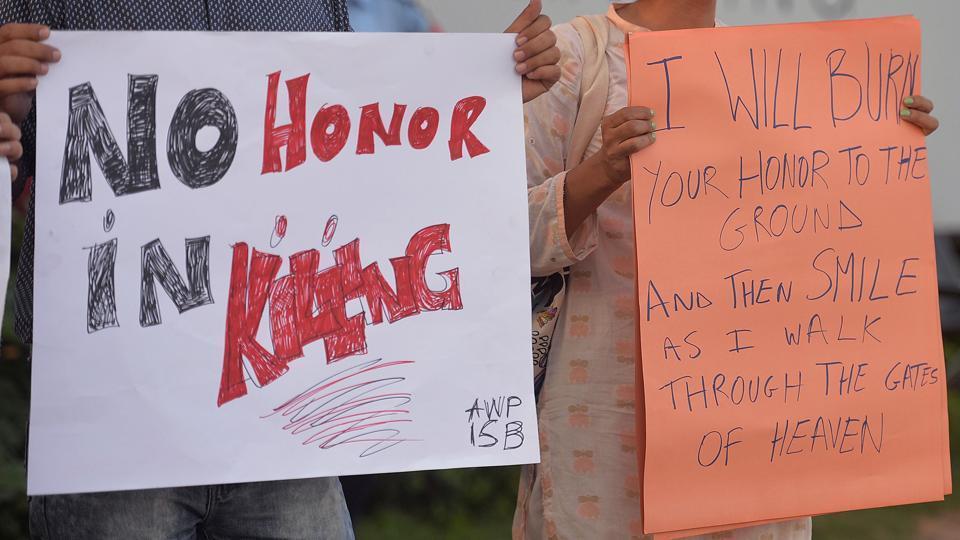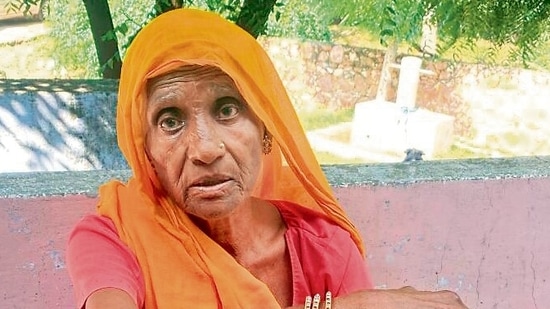| Can we come up with another term to replace the absolutely shameful, and somewhat misleading, ‘honour killings’? That’s not the only words or expression that have their origin in gendered stereotypes.
Also, on a personal note, I’m taking time off for a family vacation. See you again in June — Mind the Gap will be in your inbox on June 2. The big story The weighty business of words (and why they matter)  No honour in this crime. Source: HT file photo Earlier this week at a consultation on ‘honour’ killings, senior advocate Vrinda Grover asked: Can we please find another word to describe the murder of young people by their families for choosing to fall in love with someone of a different caste or faith? “Words matter,” Grover said. “We need a new language.” The 25-or so of us in the room nodded in agreement, but remained silent. We have all grappled with the dilemma of finding a more appropriate term to describe this truly heinous crime. To call it murder doesn’t even begin to describe what comes packed with the burden of history, tradition, and caste purity. Underlining all this is a society that fears the autonomy of adult daughters, expecting them to submit to male authority — father, brother, husband, son — yet believes that family honour is dependent on them. This week even the Supreme Court noted, “at the root of this crime is the deeply entrenched hierarchical caste system in India, and ironically, this most dishonourable act goes by the name of honour-killing.” The Centre for Law and Policy Research has a draft bill called The Freedom of Marriage and Association and Prohibition of Honour Crimes bill. And the only state in India that has a separate law, calls it the Rajasthan Prohibition of Interference with the Freedom of Matrimonial Alliances in the Name of Honour and Tradition. An origin story in stereotype  A set of drawings of a woman with 'hysteria' from an 1893 book. Source: Albert Londe It’s hardly a secret that the words we use often have their origin in gender. Hysteria comes from the Greek hystera, or uterus — hence hysterectomy. There’s an ancient medical belief that symptoms associated with it are a result of the uterus detaching itself from its usual position. Medicine has, fortunately, advanced but the association of the word hysterical continues to describe the emotional state of one gender. Men are seldom hysterical (or overwrought, the other gendered word); they are upset, angry, outraged, agitated, furious, impassioned. You get the drift. The double standards of language are littered everywhere. An assertive man is a desirable creature, not so much a woman who is pushy or bossy. Women are indecisive, men are considered or measured. Women are compassionate and supportive. Men are level-headed and ambitious. Sometimes this double standard is passed off as praise. So, instead of challenging gendered stereotypes that push women into a disproportionate burden of care work, we are praised as ‘multi-taskers’ or, ‘supermoms’ — which according to me is an infuriating condescension. In recent decades there’s been a push-back against the stereotyping of language. However, even here, I must note that the inane and cutesy ‘eve-teasing’ remains a lazy media fall-back to describe the more accurate street sexual harassment. Far too many among us use ‘ladies’ as a compliment (Mind you, women will do just fine). ‘Girls’ is used to describe adult young women. My rule of thumb? If you’re over 18, the legal age of adulthood, then you study in a women’s, not a girl’s college. Perhaps the most absurd use of girl and boy comes at marriage time, when anxious relatives ask about what the ‘girl’ does or where the ‘boy’ lives. Consider this: why are bachelors cool but spinsters, ugh, the object of pity and derision? Fun fact pointed out by @femalequotient : once synonymous with independent woman, the word spinster became an insult when society deemed that such women were a threat? When the #MeToo movement broke in India in 2018, many asked why the women hadn’t spoken up earlier. There’s a very simple answer here: women of my generation had neither the legal right nor the language to express ourselves. We relied on a whisper network of how such-and-such was a ‘creep’ who might make a ‘pass’ and so should be avoided.  A debt of gratitude to Bhanwari Devi. Source: HT file photo Workplace sexual harassment is now a legal protection, and we have Bhanwari Devi to thank. For those who’ve forgotten, the social worker from Rajasthan had accused dominant caste men of raping her for trying to prevent child marriage in her village. The judge hearing the case absolutely would not believe her because, in his mind, how could dominant caste men have even touched a dalit woman? Bhanwari Devi still awaits justice; her case languishing in the Rajasthan high court. Yet, an entire generation of Indian women owe her a debt of gratitude for being able to call out predatory bosses and colleagues. [Readers, please help me answer Vrinda Grover’s question: what’s the appropriate term to replace ‘honour’ killings? Write to me at: namita.bhandare@gmail.com |